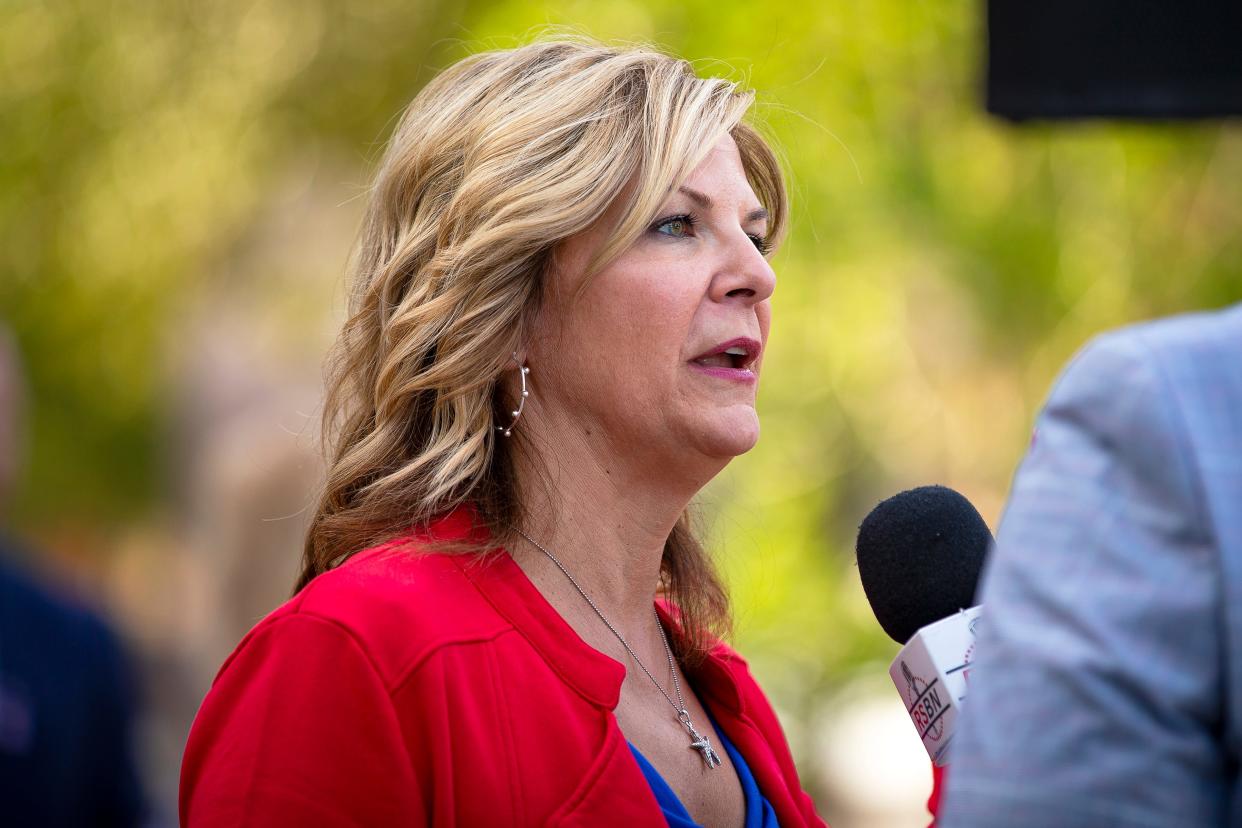Judge clears way for Jan. 6 committee to see phone records Arizona Republican party chair

- Oops!Something went wrong.Please try again later.
- Oops!Something went wrong.Please try again later.
A federal judge on Friday cleared the way for the Select House Committee investigating the Jan. 6, 2021, riot at the U.S. Capitol to subpoena the cell phone records of Kelli Ward, the head of Arizona’s Republican Party.
U.S. District Judge Diane Humetewa had already decided in August that the committee was within its rights to seek the records, dismissing a lawsuit that Ward had filed against the Jan. 6 committee in January.
On Friday, Humetewa also dismissed a request from Ward that the subpoena be placed on hold until she appealed the judge’s ruling.
Humetewa said that Ward did not meet standards for holding off the subpoena. She said, in her ruling, that Ward had not presented a “serious legal question” to be raised on appeal.
The ruling came three days after arguments in court over the subpoena, filed in January, which asked Ward’s cell phone provider, T-Mobile, to turn over call and text message activity logs from her phone from November 2020 through January 2021.
That time frame would cover the period during which Ward helped convene at state party headquarters the electors who would have cast Arizona’s Electoral College for votes for former President Trump had he won the election.
Although Trump lost Arizona to President Joe Biden, Ward and the other electors gathered anyway on Dec. 14, 2020, and declared themselves the state’s “duly elected and qualified” electors. The documents with that phony assertion were sent to Congress.
Arizona politics: Kelli Ward refused to answer questions before Jan. 6 committee
Eight states in total filed similar papers as part of a scheme meant to sow confusion on the date the Electoral College votes were counted by Vice President Mike Pence. The plan, committee testimony showed, was that Pence could either delay the certification, or toss the election to Congress under a little-used provision in the U.S. Constitution.
While the votes were being counted on Jan. 6, 2021, and after Trump supporters heard that Pence was going to certify Trump’s loss and not go along with the scheme, the Capitol was breached.
In court on Tuesday, an attorney for the Select Committee to Investigate the January 6th Attack on the United States Capitol said that the committee was looking at who Ward was in contact with during that time.
“There are aspects of her involvement that are not fully understood,” Columbus said.
He also said that information could not come from Ward herself who, under subpoena, “declined to answer every substantive question” posed by the committee.
Ward had argued that the subpoena from the committee was an overreach for two reasons.
The first was that the records would include logs of calls with clients at her medical weight loss clinic. Disclosing those phone numbers, Ward asserted in court papers, would violate federal medical privacy laws.
Previously: Jan. 6 committee can see phone records of Kelli Ward
The second was that disclosing who she talked violated Republicans’ rights to free association. Her attorney, in a court filing, said that Republicans would be dissuaded from speaking with their party’s leader in the future, for fear the contact would lead to government investigation.
In court on Tuesday, Laurin Mills, an attorney for Ward from Alexandria, Virginia, said that subpoena was “designed to discourage political discourse.”
Mills also warned Humetewa that the case was on “thin ice” and said the consequences for the nation were dire should she rule in the government’s favor.
“If you do this wrong,” Mills said, “you will set a precedent that is worse than the Capitol riot.”
Humetewa, in her ruling Friday, said that Ward’s fears of privacy rested on dubious grounds. She noted that Ward had posted video of the electors’ meeting and that she had written a book about the time period.
Doing so, Humetewa wrote “presumably publicized many of the identities of the political contacts she communicated with during that time. At the very least, this self-publication does not evidence a true concern for her contacts’ privacy.
Humetewa also noted a time pressure: The Jan. 6 committee was only authorized until the end of the year. The briefing schedule set by the appeals court went past that.
Ward’s Arizona-based attorney, Alexander Michael Kolodin, did not return a message seeking comment.
An attorney for T-Mobile, Ward’s cell phone provider, said in court on Tuesday that it would comply with the subpoena should the judge rule in the manner she did on Friday.
This article originally appeared on Arizona Republic: Judge clears way for Jan. 6 committee to see Kelli Ward phone logs

